- US equity selloff worst since May
- Declines led by healthcare, Apple, energy
- Selloff spurred by technicals
- Dollar declines continue
- Treasuries offer no sanctuary, sold off in tandem with equities
- Oil falls on US supply fears
- Bitcoin fights for its life on $10,000, pressured by regulators and Facebook (NASDAQ:FB) ad ban
Key Events
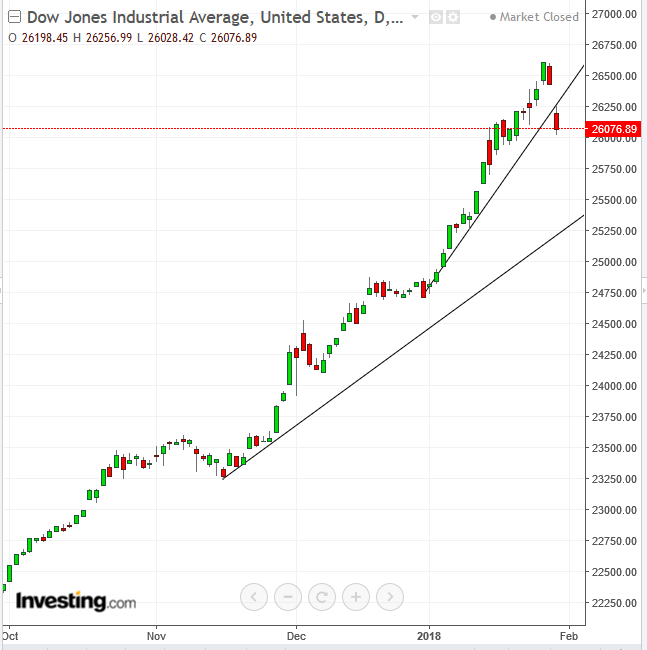
US stocks extended their slide yesterday for the biggest two day setback since May. The S&P 500 dropped 1.08 percent; the Dow Jones Industrial Average plunged by 1.32 percent; the NASDAQ declined 1.04 percent but losses ultimately were pared back to 0.85 percent, the only index which fought back; the Russell 2000 slid 0.95 percent.
Declines were led by Health Care, which lost 2.14 percent in value, as investors take profits from last week’s biggest sector gainer, after news broke that Amazon (NASDAQ:AMZN), JPMorgan Chase (NYSE:JPM) and Berkshire Hathaway (NYSE:BRKa) plan to jointly form a healthcare company that will provide US employees with "simplified, high-quality and transparent healthcare." It was the biggest sector selloff in over a year.
MetLife (NYSE:MET) shares plunged almost 9% yesterday on news that there was a shortfall in the company's pension reserves. Apple (NASDAQ:AAPL), the world’s largest company by market cap fell to a three-month low, amid reports of an inquiry by the US DOJ and SEC into whether Apple violated securities laws regarding how it informed consumers about its iOS 10.2.1 update which chemically depleted instrument batteries.
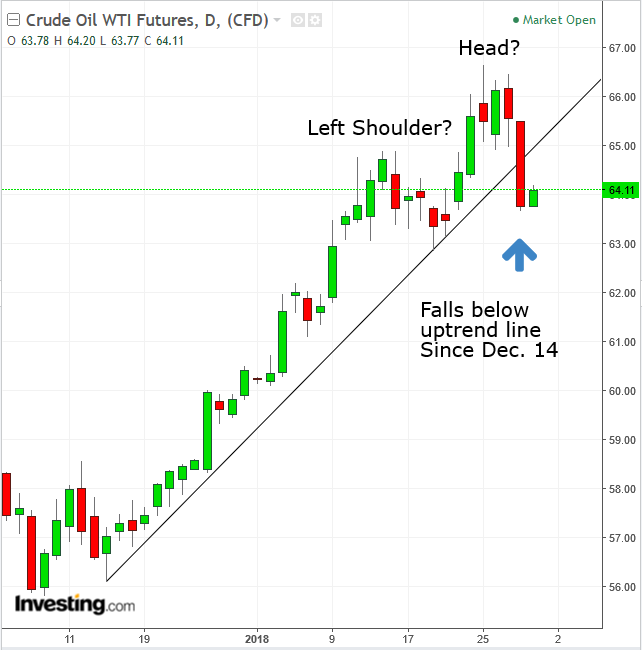
Energy producers were also sold off after a decline in crude oil prices continued for a second day. The commodity fell 3.5 percent, wiping out four days of gains.
Global Financial Affairs
There may be a variety of fundamental reasons driving the current consolidation, but they don’t seem to be sufficient triggers for this expansive a selloff, especially not with earnings generally coming in better than expected, a US rate decision ahead with the outlook for higher rates, and a US President who has been heralded for reawakening animal spirits with a promise of much more to come and economic data pointing to an improved growth outlook globally and for the US.
Perhaps the selloff was caused by technical consideration. As the strongest first trading month in decades draws to a close, investors appear to have gone through a 'sugar binge,' and could be trying to reset themselves and the markets via profit taking. Yesterday, the MSCI All-Country World Equity Index suffered its biggest two-day slide since September 2016.
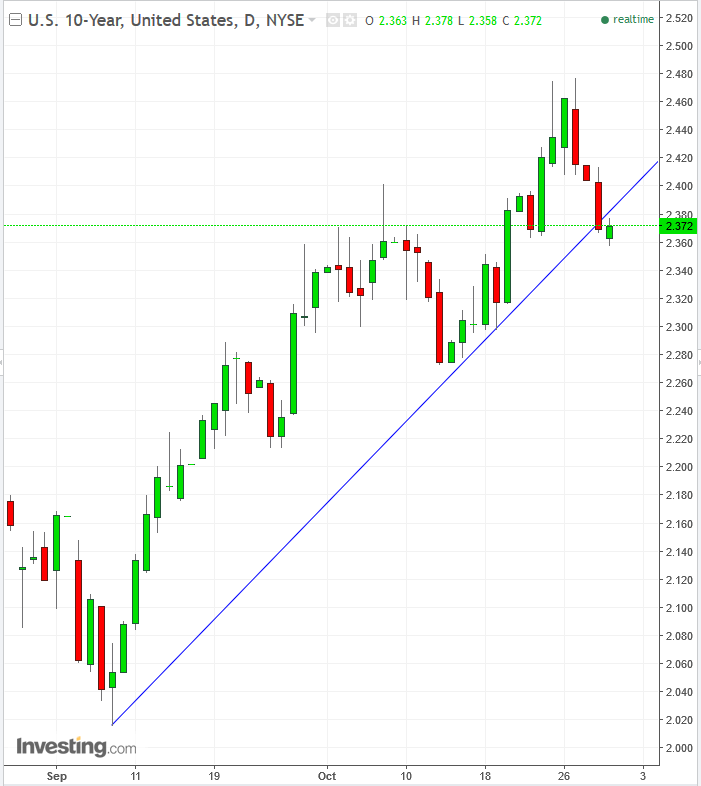
Treasuries offered no sanctuary either. The bond selloff extended, pushing 10-year yields to their highest levels since April 2014. This morning Treasury yields wiped out yesterday’s gains but yields held at 2.697, widening the decoupling from the dollar, as discussed yesterday, here.
Investors must decide whether stronger corporate earnings, faster economic growth and optimism about the US tax cuts are enough to keep propping up equity prices after a year during which the number of record highs surpassed all previous benchmarks. Goldman Sachs for example, expects a correction. However, the investment bank believe it will be temporary and provide a buying opportunity.
Asian stocks reversed earlier gains this morning to trade lower as investors continued to mull the implications of the recent run-up in bond yields. The MSCI Asia Pacific Index declined for a third session, led by industrial, energy and real estate shares. Equities listed on Australia’s S&P/ASX 200 and Hong Kong’s Hang Seng advanced while those in Japan’s TOPIX underperformed.
European stocks advanced, helping to draw a line under recent global equity declines, even as the region’s common currency strengthened. The Stoxx Europe 600 rose, with most industry sectors in the green amid a flurry of corporate results.
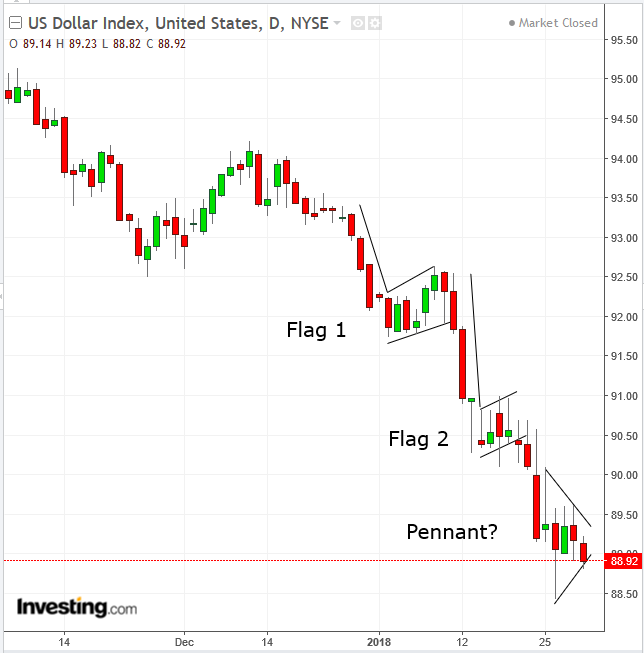
The dollar extended declines after Trump concluded his State of the Union speech; US equity futures pointed higher. He sought to connect his presidency to the nation’s prosperity, arguing that the US has arrived at a “new American moment” of wealth and opportunity.
Oil also retreated, driven by intensifying US supply fears as US production rises, forecast to continue to do so.
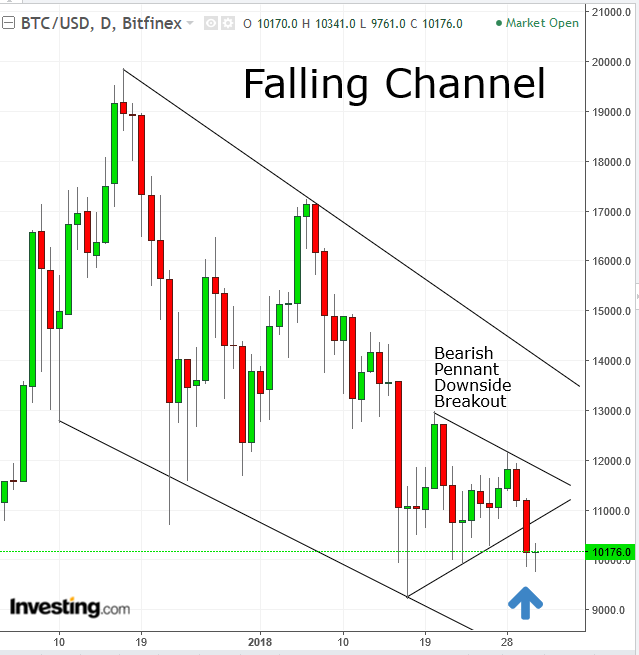
Cryptocurrencies are heading lower with Bitcoin on track for its worst monthly slide since December 2013 as US regulators ramp up their scrutiny of one of the world’s largest digital currency exchanges. As well, Facebook is banning ads tied to the industry.
Bulls are holding the cryptocurrency above the $10,000 level with bleeding nails. A fall below that may have them pulling their hair out, as it would signal a free fall to follow.
Up Ahead
- On Wednesday, the euro-zone core inflation report may show an uptick from a year ago to 1 percent this month.
Market Moves
- The Stoxx Europe 600 Index increased 0.3 percent as of 9:40 London time (04:40 EST).
- S&P 500 Futures gained 0.3 percent.
- The MSCI Asia Pacific Index decreased 0.2 percent to the lowest in more than a week.
- The U.K.’s FTSE 100 fell less than 0.05 percent to the lowest in six weeks.
- The MSCI Emerging Markets Index jumped 0.4 percent.
Currencies
- The Dollar Index fell 0.3 percent, extending a second-day decline to 0.5 percent. A close at this price would to the lowest in more than three years.
- The euro gained 0.3 percent to $1.2445, the strongest in more than three years.
- The British pound climbed 0.1 percent to $1.4164, the strongest in a week.
- The Japanese yen rose 0.1 percent to 108.71 per dollar.
- South Africa’s rand gained 1.1 percent to 11.8285 per dollar, the strongest in almost three years.
- The MSCI Emerging Markets Currency Index Index jumped 0.5 percent.
Bonds
- The yield on 10-year Treasuries dipped two basis points to 2.70 percent.
- Germany’s 10-year yield sank one basis point to 0.67 percent, the largest tumble in more than two weeks.
- Britain’s 10-year yield sank one basis point to 1.46 percent.
Commodities
- West Texas Intermediate crude decreased 0.6 percent to $64.12 a barrel, the lowest in more than a week.
- Gold rose 0.4 percent to $1,343.59 an ounce, the biggest advance in a week.
